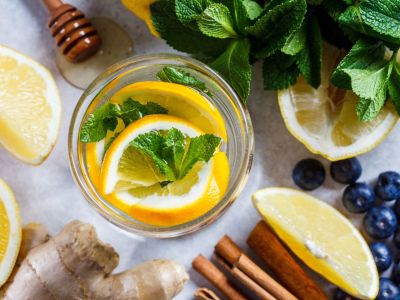Whether you’re growing food for the community or for your family, growing antiviral plants could become the wave of the future.
Do Antiviral Plants Keep You Healthy?
Little research has been done to definitively prove antiviral foods boost immunity in humans. Successful studies have used concentrated plant extracts to inhibit viral replication in test tubes. Laboratory experiments on mice have also shown promising results, but more studies are clearly needed. The truth is, the inner workings of the immune response are still very poorly understood by researchers, doctors, and the medical field. We do know adequate sleep, reduced stress, exercise, a healthy diet and even exposure to sunlight keep our immune systems strong – and gardening can help with many of these. While it’s unlikely consuming natural antiviral foods would cure diseases like the common cold, influenza, or even Covid-19, plants with antiviral properties may be helping us in ways we have yet to understand. More importantly, these plants offer hope in our quest to find and isolate compounds to combat these diseases.
Immune-Boosting Foods
As society searches for answers to our questions about Covid 19, let’s explore plants that have been relished for their immune-boosting and antiviral properties:
Pomegranate – The juice from this native Eurasian fruit contains more antioxidants than red wine, green tea, and other fruit juices. Pomegranate has also been shown to have antibacterial and antiviral properties.Ginger – In addition to being antioxidant rich, the pungent ginger root contains compounds believed to impede viral replication and prohibit viruses from gaining cell access. Lemon – Like most citrus fruits, lemons are high in vitamin C. Debate lingers as to whether this water-soluble compound prevents the common cold, but studies suggest Vitamin C promotes the development of white blood cells.Garlic – Garlic has been recognized since ancient times as an antimicrobial agent, and this zesty spice is believed by many to have antibiotic, antiviral, and antifungal properties.Oregano – It may be a common spice-rack staple, but oregano also has antioxidants as well as antibacterial and viral-fighting compounds. One of these is carvacrol, a molecule which exhibited antiviral activity in test tube studies using murine norovirus.Elderberry – Studies have shown the fruit from the Sambucus tree family produces an antiviral response against the influenza virus in mice. Elderberry may also reduce upper respiratory discomfort from viral infections.Peppermint – Peppermint is an easily grown herb that contains menthol and rosmarinic acid, two compounds proven to have viricidal activity in laboratory studies.Dandelion – Don’t pull those dandelion weeds yet. Extracts of this stubborn garden intruder have been shown to have antiviral properties against influenza A.Sunflower seeds – These tasty treats aren’t just for the birds. Rich in vitamin E, sunflower seeds help to regulate and maintain the immune system.Fennel – All parts of this licorice-flavored plant have been used for centuries in traditional medicine. Modern research indicates fennel may contain compounds with antiviral properties.
